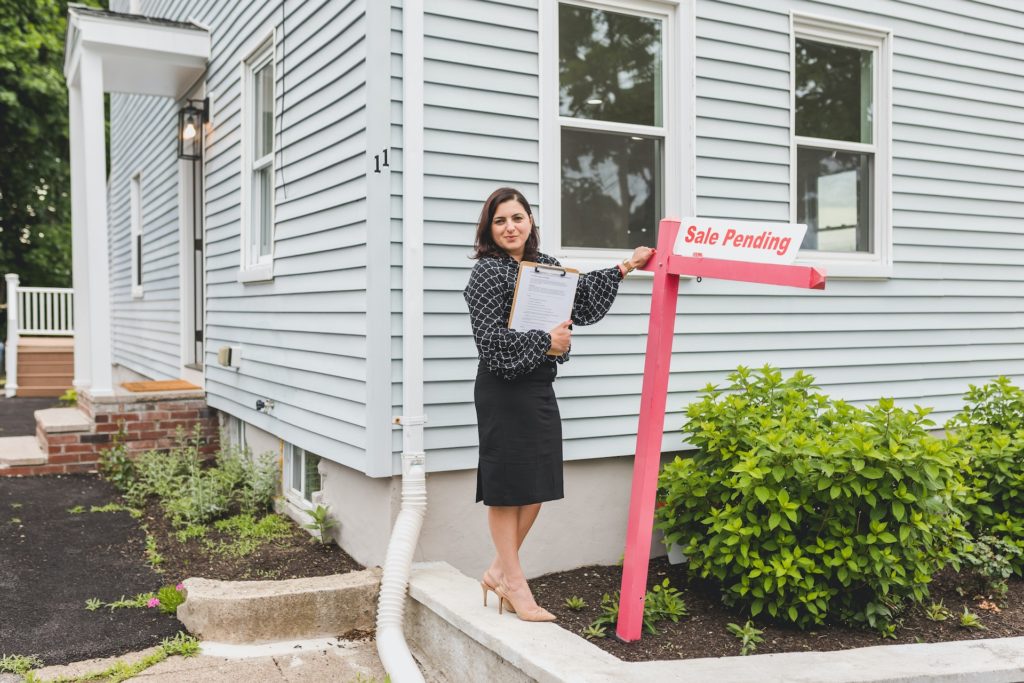At the later stages of your parents’ life, you may be in a position where you have to make all the critical decisions about their well-being, as well as their property. In many cases, the children who inherit their parents’ house get to decide what to do with it. The final decision whether to sell a house or not should be made in agreement with all beneficiaries, and for many families, this is not an easy process.
Although there are no correct answers here, it’s best to make this decision with a complete set of information, and that means one should consider various options and learn about the benefits and drawbacks each of them entails.
The typical scenario for people is deciding if selling their parents’ house before death is the right move. It might be a difficult call for various reasons; for example, it’s often hard to say goodbye to all the memories and history created inside the home’s walls.
But this solution has its advantages, so it is worth exploring. If you’re thinking about taking this step, here’s what you need to know!
Tax Implications of Selling Parents’ House Before Death and After It
When it comes to selling the property, there are two very common scenarios. One includes selling parents’ house before death and the other – doing so after their passing. Both of these situations come with different tax implications for the seller.
Taxes for People Selling Their Parents’ House Before Death
Let’s start from the most optimal situation when it comes to paying taxes, which is the scenario in which no one has to pay any taxes related to the sale. Of course, every case is a little different, so it is advisable to consult with an estate attorney or tax advisor to discuss the individual circumstances and concerns regarding this topic.
In the simplest terms, if the parents themselves sell their house, they are not obligated to pay capital gains taxes. This way, they can also leave some or all of the money from the sale to their heirs, who don’t have to pay any taxes from it as well.
This tax break may not apply under some conditions. These would be
- If the parents owned the property for less than two years prior to selling it.
- If the property was not their primary place of residence, meaning it was a vacation home, for example.
- If the parents didn’t live in the house for at least two years in the five years preceding selling the property. There are some exceptions to this rule, for example, people from the military, Foreign Service, intelligence community, and people with disabilities. You can learn more about it here.
By meeting these criteria, the house sellers don’t have to pay capital gains tax up to $250,000 of capital gains on real estate if they are single and $500,000 of capital gains on real estate if they are married and filing jointly.
Additionally, if one parent dies, the other spouse has two years to sell the property in order to qualify for the higher threshold of $500,000 of capital gains.
The sum of tax-free money that can be gifted after selling the house is $15,000 per person per year. This means parents can gift each of their children and their spouses $15,000 in a single year to avoid paying taxes. But that’s not all.
There are a few other ways to pass down the money without the obligation to pay taxes, one of them being a 529 plan. Of course, this is the route that allows parents to fund their children’s qualified education expenses, so it might be eligible only in cases when the beneficiary plans to start or continue their education.
Overall, there are many tax benefits to selling the parents’ house before their death. This looks a little differently when the property is being sold after their death.
Taxes for Those Selling Parents’ House After Death
If you want to sell parents’ house after their death, here’s what you need to know about taxes. It’s not the same as selling property before parents’ death when the seller can avoid paying taxes altogether. In this variant, you are obligated to pay the capital gains tax on the money you gain from the transaction.
You may benefit from the step-up in basis loophole, though. This loophole adjusts an asset’s tax value to its value at the time of the original owner’s death, ensuring recipients can gain more capital gains with less significant taxes. What does it look like in practice?
The basic principle of the step-up in basis is to protect the interests of the sellers. When the seller makes a profit from the transaction, meaning it sells the asset for more than they paid for it, they are obligated to pay the capital gains taxes.
With the step-up in basis, today’s fair market value of the property is considered. Let’s say that your parents bought the house years ago for $100,000, and today’s value of the property is $300,000. When you make a profit from the sale, for example, you sell it for $350,000, you won’t have to pay the capital gains tax on the sum of $250,000 (which would be considered a total profit), but from the sum of $50,000, (which is your actual profit.)
This is way more profitable for sellers, as they don’t have to pay higher taxes.
What About the Inheritance Taxes?
Inheritance tax or estate tax is not obligatory for everyone in every state. The good news is that there is no inheritance tax at the federal level, and the estate taxes are obligatory for those with high income, so most people are not affected by them.
States like Iowa, Kentucky, Maryland, Nebraska, New Jersey, and Pennsylvania have inheritance taxes, and Maryland is the only state that charges both an inheritance and an estate tax. Inheritances don’t have to worry about inheritance tax as long as the property’s value is not larger than $11 million.
If you’re living in any of the states with the inheritance tax, you may want to research and contact your tax advisor to discuss how much you will have to pay in case you want to sell your parent’s estate.
Selling the House Going Through Probate
This is an important piece of information for those who want to sell their parents’ home after their passing. As the definition says,
“Probate is the formal legal process that gives recognition to a will and appoints the executor or personal representative who will administer the estate and distribute assets to the intended beneficiaries.”
The probate process occurs when there are no appointed heirs to the property. In this case, it’s the probate court that appoints the house to the close relative of the deceased, who can make decisions about selling the house.
This process will extend the time of the whole selling process of the inherited house, so it might be one of the better arguments for selling property before the parent’s death. Another way to avoid probate can be to ensure the homeowners, which in this case are your parent, will draw up their will before passing.
How to Prepare for Selling Your Parent’s Property?
Selling property inherited from your parents can seem complicated, especially if you don’t have much experience in this process. We went over what you can expect in terms of paying taxes when you decide to sell the house, but there is much more to cover in terms of how to prepare for making such a transaction.
Below you’ll find valuable tips and pieces of information regarding selling the property before and after your parents’ death.
Prepare the Place for Listing
Before you put the property on the market, you may want to evaluate what, if anything, needs to be done to sell it with the most considerable profit. Sometimes inherited property requires extensive repairs in order to attract a bigger pool of potential buyers. How do you know when investing in the property is the right move?
Everything will depend on your individual circumstances. If you don’t have much free cash to invest in making extensive repairs, then you should consider doing the bare minimum. You should clean the property inside and outside. That means removing all the furniture and unnecessary equipment and cleaning the house.
Oftentimes, houses would benefit from repairs such as replacing the carpeting, painting the walls, making necessary roof and construction repairs, investing in new kitchen equipment, HVAC, or water heater, etc.
Whether or not these repairs should be made is an individual call, but you can get some clues by analyzing the local housing market. If there are not so many properties being renovated and upgraded in the neighborhood, then you may as well skip this step and list the house in the condition you inherited it.
And if many houses are being repaired and renovated, you can decide on making those upgrades too to be more competitive. If you want to receive support in assessing whether or not any changes to the property are required, you can contact the local real estate agent and consult with them about the state and potential future of your property.
By working with a real estate agent, you can receive a market analysis and estimations of prices you could place on the house before and after renovation. This may give you valuable data to help you make an informed decision.
Selling Property to a Cash Buyer
Of course, working with a real estate agent is not your only option. If you care about shortening the whole process and wish to sell your inherited property for cash, you can contact a company that buys houses directly from the homeowners. This is precisely what we do at Highest Cash Offer.
This solution has many advantages. You don’t have to clean or make any repairs to the house to sell it for profit if you don’t want to. We buy houses in “as is” condition, taking all the worries about the property state out of your hands.
Working with our company can allow you to sell the house fast without any unnecessary complications and for a fair cash offer. Costs borne by the seller are minimal, as you don’t have to worry about hiring a cleaning crew, making home repairs, investing in new amenities, etc. You can also save your time, as there is no need to prepare the house for listing and wait for the right buyer.
Selling your parent’s house fast is possible and stress-free if you decide to work with one of the quick sale companies specializing in buying houses to flip them or rent them.
Highest Cash Offer guarantees seven days cash-out period, zero closing costs, and an offer for the house within 24 to 48 hours. If this sounds like something you might be interested in, contact us and get more information.
Is It Better to Sell a House Before or After Death?
Generally speaking, there are fewer complications and tax implications when you or your parents sell the house before their death. In this scenario, you don’t have to worry about the probate process that can take up to several months and increase the costs of selling your parent’s home.
You are also free from worrying about the inherence tax. You can sell the house before death and use the money from it to cover your parents’ medical bills or use the money as your inheritance.
How Do I Avoid Capital Gains Tax on Inherited Property?
The most effective strategy to avoid capital gains tax on inherited property is to sell it before it increases in value. If the property at the moment of the death of a parent is worth as much as when it’s sold, you won’t have to pay capital gains tax, as your profit is equal to zero (thanks to the step-up in basis).
Can a House Be Sold Before Probate is Granted?
A lawyer can explain all the details and exceptions when it comes to the probation process, so if you have the estate that needs to get the grant of Probate, you should consult with a professional.
In the simplest terms, the property needs to be transferred to the executor of the will before it can be sold. Technically, the house can be listed, and in some cases, the executor can even allow the buyer to take over the property before that happens. Still, no transfer of money can occur before the executor is granted the title to the house.
Can I Buy My Parents’ House to Avoid Inheritance Tax?
If you’re living in one of the states with an inheritance tax and you’re worried it might be applicable in your case, you can consider buying your parents’ property before their death.
Unless there are some restrictions placed on the property, you can buy your parents’ house for whatever price you agree on. When the property passes on to you, it’s not considered an inheritance anymore, so the inheritance tax cannot be applied.
Summary
Selling your parent’s property before or after their passing can be challenging. Not only do you have to say goodbye to many memories and life your parents led in the house, but there are many formalities you have to think about.
The easier route is to sell the house before the death of your parents, as this way, you can avoid paying any capital gain taxes, and selling of the property doesn’t have to be granted by the probate court, which can take up to six months.
One of the fastest ways to sell the house is to a company that will purchase the property for cash. You can sell your parents’ house to the Highest Cash Offer and receive your money in seven days! No need to worry about cleaning or renovating the house – we buy houses in an “as is” condition and offer the most competitive prices.
Contact us and sell the house fast and easily.









 Highest Cash Offer is a real estate solutions company. Our team of experts specialize in assisting homeowners with a wide variety of solutions to any real estate problem. Whether we buy your house for cash or not, our goal is to help you get the desired outcome you deserve.
Highest Cash Offer is a real estate solutions company. Our team of experts specialize in assisting homeowners with a wide variety of solutions to any real estate problem. Whether we buy your house for cash or not, our goal is to help you get the desired outcome you deserve.